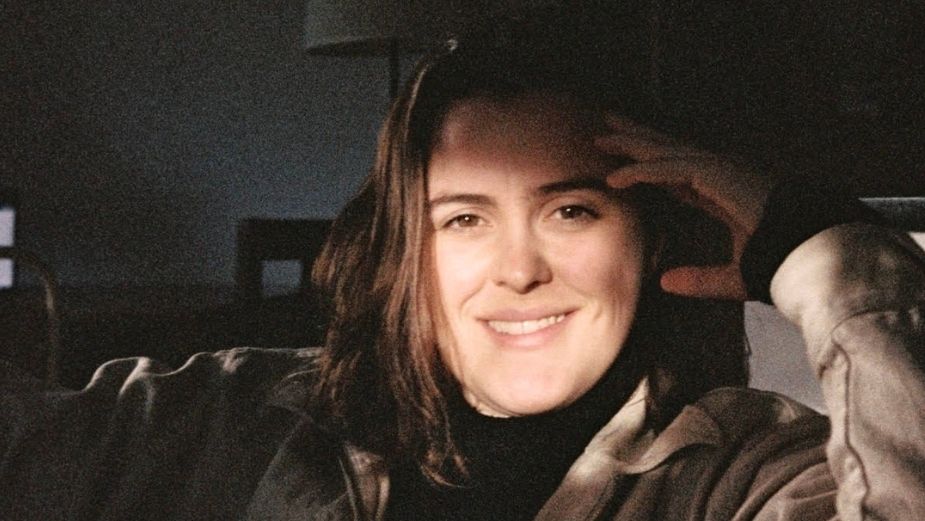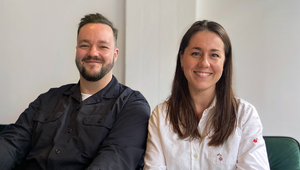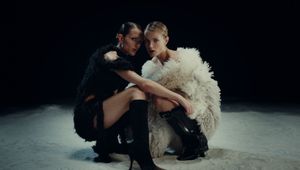
Sorcha Bacon: “Queer Cinema Shouldn’t Be Reserved for Niche Audiences Only”

At OKAY STUDIO we’ve become known for eye-opening campaigns, made by creatives that go that little bit further - ensuring that the work really means something.
We believe that advertising, and film in particular, has the power to enact cultural shifts that will take us closer to a society that is fairer for all. That is why we are thrilled to support this LBB interview series to hear about our industry peers’ favourite ground-breaking work, the kind of pieces that make you stop and think.
Sorcha Bacon is the BAFTA-nominated producer and founder of Try Hard Films, which focuses on telling marginalised stories - with originality - that we don’t often get to see. Try Hard Films, in their own words, are “looking for authentic, authored and ambitious work, never compromising on artistic quality” while working “on the margins of documentary and fiction, often blurring the lines between the two.”
Her short films Wren Boys, Pompeii, and If You Knew premiered to critical acclaim, getting nominated and winning awards. In 2019, Sorcha produced Mother, a queer coming-of-age story taking place at the heart of Brazil’s vibrant voguing scene. Together with Loran Dunn and Savannah James Bayly, Sorcha is currently working on adapting the LGBTQ+ YA novel, Amelia Westlake Was Never Here.
Sorcha tells LBB’s Zhenya Tsenzharyk what attracted her to producing, what kind of queer stories still need to be told, and why empathy is her secret weapon when it comes to dealing with production challenges.
LBB> How did you get into producing?
Sorcha> It was kind of by accident. My best friend at university was a cinematographer. He got really into photography and had done a competition and ended up travelling to Eastern Europe. He got a camera at a flea market and that’s when we got really into making things together. We left university and then set up a company together called Try Hard and started making short films. I wanted to be a cinematographer but also wanted to have a go at producing. We just started by accident, and then completely got the itch very quickly. We didn't stop after.
LBB> Once you got a taste of producing, which parts appealed to you?
Sorcha> I always had an interest in storytelling and organisation, which are two slightly contradictory things. I always wanted to work in the creative industry one way or another; at one point I wanted to work in music. I did a lot of gigs when I was 16 in London, and then got into film and realised it felt like a more meaningful way of connecting with people and connecting people to the arts. I really enjoyed the process of building a team and making something that felt slightly more tangible rather than an event that felt like it was over in a flash. I like the idea of creating something that could have an impact — that can really be enjoyed — rather than an event that’s a one off.
LBB> In this industry, tapping into ground breaking or emotional stories is what a lot of people do. What projects have you worked on that has emphasised this?
Sorcha> One of the first projects that I did that made people notice what I was trying to do was a project called Wren Boys. It was a film about two very masculine presenting guys, where one of them is in prison and the other goes to visit. They decide to get married on St. Stephen's Day, which is the day after Christmas. There's a tradition in an old part of Ireland called the ‘wren hunt’ where boys would go out and kill a baby bird and take it around the houses to try and raise money for it. That tradition doesn't exist now because it's a violent act and it's unnecessary, but the film explores what happens when we change our ideas of what tradition is.
At the time, there was a question around gay marriage in Ireland and the short film was trying to unpick why we hold on to some traditions and don’t hold on to others. A lot of my work as a producer, especially near the beginning of my career, was focused on queer storytelling and recognising that I wasn't seeing those stories in interesting, nuanced, and slightly more surprising ways.
LBB> When you started in the industry, what queer stories were you coming across?
Sorcha> There was an overwhelming sense that queer cinema was something that wasn't mainstream and instead something that was reserved for niche audiences only. It wasn't getting the budgets it deserved or audience recognition. I think the watershed moment for that was the release of Moonlight. The film really captivated a much bigger audience but was still super aware of idiosyncrasies of the moment for that character.
I am working on trying to break down a lot of these barriers, but it still feels like a lot of queer stories are tragic, the butt of the joke, or queer characters just being the BFF. These stories are not given an audience and if it is, it is always referred to as queer stories, rather than just love stories.
LBB> From your perspective, in what way can post-production elevate a piece of work?
Sorcha> People always say films are written three times: in the draft, while shooting, and then in the edit. But I think it's also rewritten again in post — the story can change and come alive. You can totally rewrite a score, you can create a tone, you can build an atmosphere, and you can pull something apart that wasn't meant to be there and build it back together. You can even colour grade something to make it feel totally different in a genre to what you might have gone out to shoot. It always amazes me how incredible post-production is, how much we can do, and where it's heading. In a simple sense, post-production is the final piece of the puzzle. It's the final bit of the craft. It's one of my favourite parts of the process, probably because it’s the least stressful.
LBB> Do you feel like there's more control at that point?
Sorcha> Yeah, for sure. It feels like the most structured. The deadlines are clearer, and you know how to get things finished and across the finish line.
LBB> Thinking about the industry today, what kind of work is exciting you? What pieces of work have you seen that have really stayed with you?
Sorcha> One of my favourite films of the last year was the animated documentary Flee. It was a really clever way of telling a very powerful and meaningful story but through a medium that we don't give as much recognition to in the industry. One of my animator friends tweeted that last night at the Oscars, the Oscars said that animation was for children, and I totally disagree with that. Documentary is such an interesting and exciting space to play with form and to play with how you can tell a story because if you don't have visual access to something, then how can you recreate that? Flee does such a good job of finding a way to tell that story in a space where you couldn't have the footage because of various reasons.
LBB> With producers, Lauren Dunn and Savannah James Bailey, you're adapting an LGBTQIA novel to screen. Why do you believe that sharing these stories is important in today's climate?
Sorcha> What's extraordinary is that we're in 2022, and there's not been a big, exciting, queer high school, teen movie with female queer characters as the lead. It’s frustrating. There was Love Simon, which was brilliant. That was the catalyst for us. The tagline of Love Simon is “everyone deserves a love story.” We stood back and thought, “Okay. That's interesting,” because there's not been a lesbian love story done in a way that's super commercial and joyful. We're very lucky to be working on that project and getting it to a place where, hopefully, we can get into production which is exciting. Lauren, Savannah, and I are very good friends who’ve spent a lot of time being grumbly about the fact that these stories don't exist. Just before the lockdown we said, “Well, let's change that.” If we feel like something needs to be told, then we’ll go out of our way and tell it. Let's not wait for someone else to do it disappointedly.
LBB> You're making waves in the industry by putting diverse characters at the forefront of your work. How does this go hand-in-hand with pushing creative boundaries — if you think it does at all?
Sorcha> I don’t believe diversity pushes creative boundaries. Inclusivity pushes boundaries. Diversity has become a buzzword in the industry that often feels quite devoid of any real meaning and thought. I think I'm more interested in making inclusive cinema rather than diverse cinema. Diverse cinema feels like you're not really listening to everything that goes into production. Making sure we're being inclusive and listening to people's voices feels more boundary pushing to me. It would do more for changing what we're seeing on screens and changing how the people who oversee a film plan. It gives more space for underrepresented voices to be heard.
LBB> How is Try Hard Films challenging creative norms?
Sorcha> I like to push filmmakers away from more traditional storytelling. What’s the slightly madder way of telling a story? How can we push the boundaries of what feels comfortable?
LBB> Why do you think that form is something that you focus on, as opposed to the narrative?
Sorcha> It’s how you can play with storytelling. We're in a moment where content goes straight to streamers where in the olden days, it’d got straight to DVD. It feels like we're losing track of those more monumental storytelling moments, because of the overload of information especially in the TV space, and trying to bring audiences back.
The project I just did with OKAY Studio, a structured reality piece, was a boundary pushing project because it was sort of edging on the border between narrative and documentary. It was an interesting opportunity to look at real stories but through a structured lens.
Everyone wants their film to be at the cinema, but you must think about the reality of how people are consuming information and stories and if there are better platforms for engaging audiences. Could we put our films up on Onlyfans or on Grindr? We did that once. With Pompeii, we put it out on a queer dating app in New York, which I think was such a fun way of having people engage with the film.
LBB> That's interesting. Were you planning on doing that?
Sorcha> We were approached by a company that was trying to put something up for Pride WeekIt was nice to be creating a specific queer story about the problematic nature of some male spaces. We showed that to a dating app, where some profiles resonated with this kind of story. It's nice to see our film exist in a space where those conversations are happening, and real people are engaging.
LBB> Telling stories that focus on marginalised groups can often instil a sense of responsibility. How do you approach that? Do you feel a sense of responsibility in any way?
Sorcha> I do because as producers we become very responsible for the voices and the stories that we want to tell. I don't ever want to tell stories in a way that feels like I'm sensationalising for the sake of a profit margin. I don't think that's the way that we should do it as producers. Referring to earlier, that's kind of what I meant about feeling like everyone's on the hunt at the minute for diverse voices, but it's not inclusive. It's like everyone's trying to get something made, but it's not actually holding those who are involved responsible. They aren’t looking after contributors, actors, or more vulnerable folk who are involved in projects. That also comes down to the crews that I work with and trying to ensure that it feels inclusive. If you're making something, you want the crew to reflect your content and vice versa. That's always been part of the way we approach projects.
LBB> What do you believe makes a great producer?
Sorcha> A great producer is tenacious, but patient, and ultimately, incredibly empathetic and compassionate. That to me is more important than being very business-oriented. If you can't have empathy for what you're doing, or for the people you're working with, then when things get difficult, you can't resolve problems because you're not listening to people.
You must be a compassionate person who's there listening to everyone's anxieties, taking in people's thoughts, and then making situations better. From day one, when you get on board with a project, and you're working with a writer and director all the way to delivery, someone might get angry about something, but it's never really about the film. It's about what's happening at home, or what's going on in their life. Having that compassion is crucial to being a producer, and you'd be really surprised at how few people have that skill.
LBB> What advice would you give to anyone who's going down the path of producing in the industry?
Sorcha> If you find a way to survive while also making the films you want to make, that is a rewarding place to be as a producer. I'm very fortunate to be able to be producing in other sectors but also producing my own work. If you can find a way to be honest, truthful and know what you want to say as a producer, then that’s a special place.
One great piece of advice that I got was to think about your obituary and think about that as the end of what your future career could look like. Everyone in this industry always feels like they are playing catch up or asking themselves what they are going to do next. Think about the long game and don’t get terrified of feeling like you’ve not done what you need to do yet.













